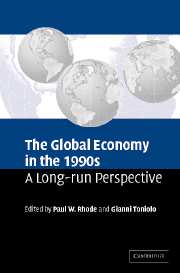Book contents
- Frontmatter
- Contents
- List of figures
- List of tables
- List of contributors
- Preface
- 1 Understanding the 1990s: a long-run perspective
- 2 The world economy in the 1990s: a long-run perspective
- 3 Managing the world economy in the 1990s
- 4 Europe: a continent in decline?
- 5 Technical change and US economic growth: the interwar period and the 1990s
- 6 General-purpose technologies: then and now
- 7 Productivity growth and the American labor market: the 1990s in historical perspective
- 8 The 1920s and the 1990s in mutual reflection
- 9 Bubbles and busts: the 1990s in the mirror of the 1920s
- 10 The 1990s as a postwar decade
- 11 What is happening to the welfare state?
- 12 The American economic policy environment of the 1990s: origins, consequences, and legacies
- References
- Author index
- Subject index
12 - The American economic policy environment of the 1990s: origins, consequences, and legacies
Published online by Cambridge University Press: 14 January 2010
- Frontmatter
- Contents
- List of figures
- List of tables
- List of contributors
- Preface
- 1 Understanding the 1990s: a long-run perspective
- 2 The world economy in the 1990s: a long-run perspective
- 3 Managing the world economy in the 1990s
- 4 Europe: a continent in decline?
- 5 Technical change and US economic growth: the interwar period and the 1990s
- 6 General-purpose technologies: then and now
- 7 Productivity growth and the American labor market: the 1990s in historical perspective
- 8 The 1920s and the 1990s in mutual reflection
- 9 Bubbles and busts: the 1990s in the mirror of the 1920s
- 10 The 1990s as a postwar decade
- 11 What is happening to the welfare state?
- 12 The American economic policy environment of the 1990s: origins, consequences, and legacies
- References
- Author index
- Subject index
Summary
One phrase perhaps best summarizes the origins, consequences, and legacies of the economic policy environment of the 1990s: tax cuts. The passion for tax cuts as a kind of “Holy Grail” of a “new classical” economics was so intense that even the major political parties, towards the end of Ronald Reagan's second presidential term, could find little about which to disagree on that score. All that was left was political pandering to targeted constituencies. For the Republicans, that meant emphasizing the usefulness of tax reduction for upper-income groups and the broadening of the argument to include proposals for reductions in the prevailing levy on capital gains; for the Democrats, the riposte was to focus on what was beguilingly labeled “middle-class tax relief.” Both parties flirted with radical suggestions to eliminate the entire structure of income taxation itself – usually toying with half-baked ideas concerning the implementation of a single- (or “flat-”) rate income tax or a national sales (or “value added”) tax. With genuine justification, an observer new to the scene might have concluded, during the 1988 presidential campaign especially, that John Maynard Keynes (not to mention his like-minded colleagues and students) had never published a word.
Like most nostrums, tax reduction created more problems than it solved. Federal spending, whether engrossed by military initiatives such as those undertaken during the Reagan presidency, or propelled by transfer payment programs long on the books, rose in both absolute terms and on a per capita basis throughout the 1980s and early 1990s.
- Type
- Chapter
- Information
- The Global Economy in the 1990sA Long-Run Perspective, pp. 263 - 279Publisher: Cambridge University PressPrint publication year: 2006
- 1
- Cited by



